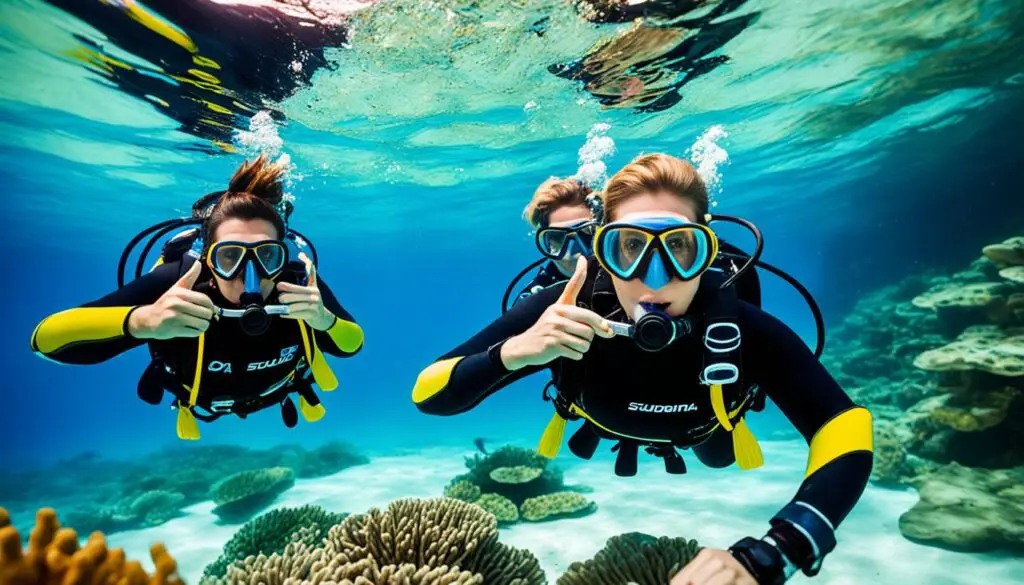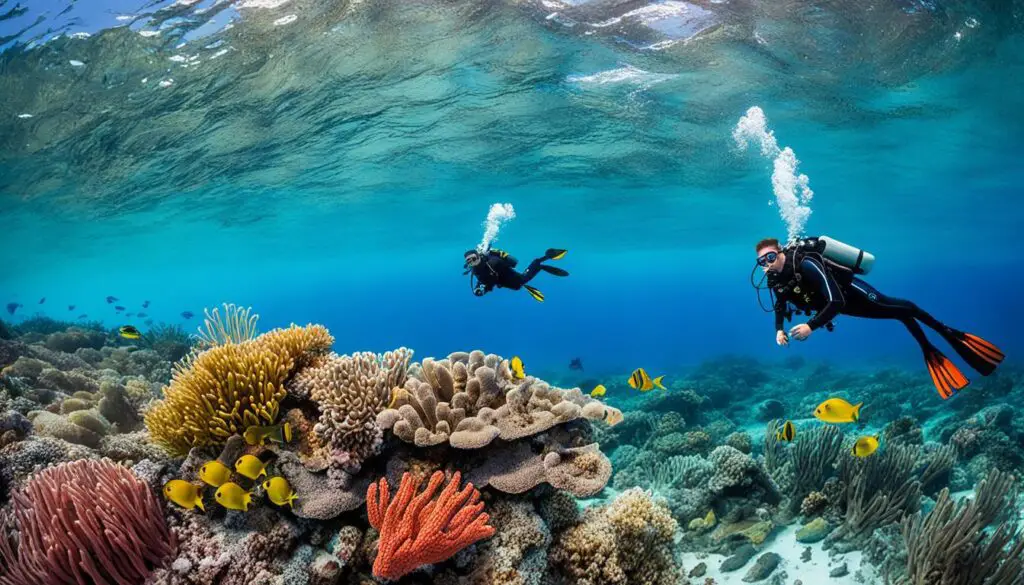Scuba diving opens a door to thrilling adventures and new experiences. Finding the right class is key to earning your dive certifications. We’ve highlighted top spots for PADI certification, with amazing marine life and expert instructors.
Key Takeaways:
- Learning to scuba dive opens up a world of adventure and exploration.
- Choosing the right dive class for beginners is crucial for obtaining dive certifications.
- The best places to learn to dive and get your PADI certification offer diverse marine life and stunning coral reefs.
- Qualified instructors ensure a safe and enjoyable diving experience.
- Start your scuba diving journey today and discover the wonders of the underwater world.
What’s Involved in Learning to Scuba Dive?
Starting the PADI Open Water Diver course is the beginning of an amazing journey. You’ll learn everything you need to explore the underwater world safely. This course covers both skills and knowledge.
You’ll get a manual or an eLearning course to study from. These materials talk about diving theory, equipment, and techniques. They are your go-to guide during your training, helping you understand the basics.
The PADI course includes classroom time, pool dives, and open water dives. In class, instructors will cover diving physics, planning, and safety. They make sure you’re ready for the adventure.
When done with the classroom, you’ll move to the pool. Here, you practice essential skills like controlling your buoyancy and communicating underwater. This helps you handle real-world diving situations better.
Next comes the open water part. You’ll do four dives in a lake or ocean with your instructor. These dives are where you really put your skills to the test. Plus, you get to see amazing sea life.
The PADI course slowly but surely grows your diving skills. From learning in the class to diving in open waters, you become more confident. Each step helps you become a skilled diver.

Course Breakdown:
| Course Component | Description |
|---|---|
| Learning Materials | Receive a manual or access an eLearning course to cover diving theory, equipment, and techniques. |
| Classroom Sessions | Engage in interactive sessions to learn about diving physics and physiology, dive planning, equipment selection and maintenance, and safety protocols. |
| Pool or Confined Water Dives | Practice basic scuba skills, including buoyancy control, mask clearing, regulator retrieval, and underwater communication, in a controlled environment. |
| Open Water Dives | Embark on four dives in a natural body of water to apply your skills and explore the underwater world. |
| Certification | Successful completion of the course leads to a PADI Open Water Diver certification, allowing you to dive to a maximum depth of 60 feet with a buddy. |
Best Places to Learn to Dive and Get Certified
Many amazing spots worldwide are perfect for learning to dive. You can get your dive certification at these places.
Here are some of the best spots:
- Bonaire: Known for its abundance of marine life and protected dive sites.
- Maldives: Pristine white sand beaches and excellent reefs make this a popular destination.
- Belize: With its barrier reef and wide variety of dive sites, it’s a great place to get certified.
- Canary Islands: Sunny days, warm water, and unique marine species to spot.
- Mexico: Both the Caribbean side and the Pacific side provide diverse diving experiences.
- Greece: Offers a range of diving opportunities, from walls and wrecks to caves.
- Great Barrier Reef: A must-visit for any diving enthusiast.
- Indonesia: 17,508 islands offering biodiversity unlike any other place on earth.
- Thailand: Calm, shallow sites make it an excellent choice for beginners.
- Philippines: Crystal-clear waters and diverse marine life make it a paradise for diving.
These destinations have trained dive instructors and resorts for a safe and fun learning time.

Imagine learning to dive in these beautiful places. It’s more than just getting certified. You’ll experience the enchanting underwater world.
Conclusion
Ready to explore scuba diving and get certified? There are many great places to start your journey. You might enjoy the warm waters of Bonaire or the beauty of the Maldives’ reefs.
Choose a good instructor and take the right classes. This will help you learn how to dive safely and with confidence. Scuba diving lets you discover a whole new world under the sea. You’ll see amazing marine creatures and beautiful underwater scenes.
So, grab your gear and begin your dive adventure soon! It doesn’t matter if you’re just starting out or looking to advance your skills. Scuba diving has many wonders for you to find. All you need is the right training and a love for exploring. Then, you’re off on a great journey under the water.
FAQ
What are the prerequisites for taking a dive class for beginners?
Most dive classes for beginners don’t require anything special. Knowing how to swim is a good idea. It’s also important to be comfortable in the water.
How long does it take to complete the PADI Open Water Diver course?
The PADI Open Water Diver course takes 3 to 4 days on average to finish. The actual time needed might be different for each person. It depends on how fast you learn and how the course is scheduled.
Can I choose between a manual or eLearning course for the PADI Open Water Diver course?
Yes, you can pick between studying with a physical manual or online with eLearning. Both options will teach you what you need to know. They both help you get ready to become a certified diver.
Is it necessary to have diving equipment before starting the dive class for beginners?
No, you don’t have to own diving equipment before your first dive class. Dive centers usually provide everything you need. Instructors will give you the gear for training sessions.
Can I dive alone after completing the PADI Open Water Diver course?
After getting your PADI Open Water Diver certification, you can dive to 60 feet with a buddy. This means you should always have another certified diver with you when you dive. Diving with a buddy is not just a rule, it’s safer that way.
Are there any age restrictions for taking a dive class for beginners?
The age limit for dive classes varies. Most require you to be at least 10 years old. But, some centers might have a minimum age that’s a bit older. Check with your local dive center.
Do I need to be a strong swimmer to learn to scuba dive?
You don’t have to be a great swimmer to learn scuba diving. Knowing how to swim helps, but the main skills you need are in controlling your buoyancy and moving correctly under the water.
Can I become a certified diver if I have a fear of water?
Getting over a fear of water can be tough. But, with the right teachers and support, it’s possible. Many dive centers have special programs for those with water fears. They can really help you learn and become certified.
Can I choose a specific destination to learn to dive and get certified?
Yes, you can select a unique place to learn and get certified in diving. There are amazing spots globally with fantastic diving and great teachers. You’ll find both safe and fun learning experiences.
How do I choose the best place to learn to dive?
To pick the best diving spot, look at the marine life variety, dive site quality, and instructor skills. Also, check if there are good resorts or places to stay. Reading reviews will also guide you to the right choice.
Is scuba diving only for experienced divers?
No, anyone can learn scuba diving, not just the experienced. There are classes designed just for beginners. They will teach you all you need to dive safely and have fun.
